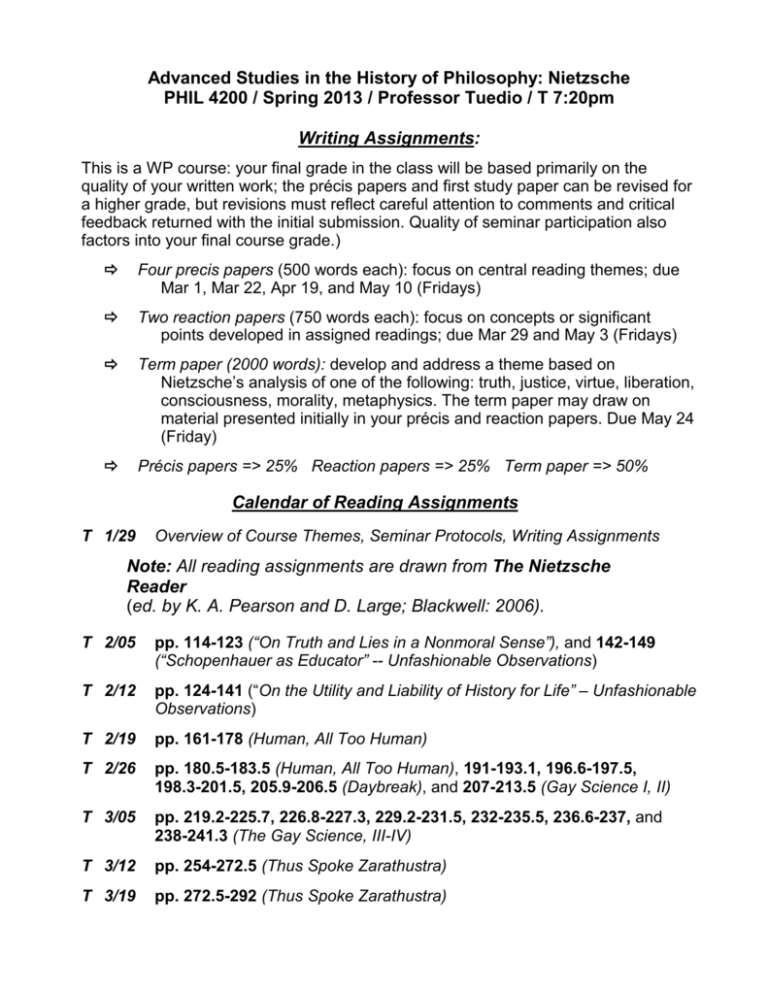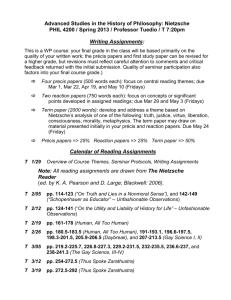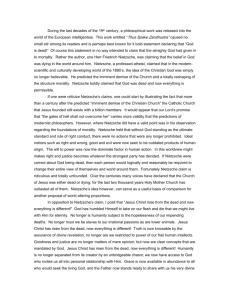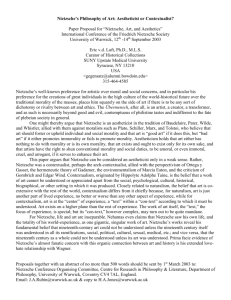Nietzsche Seminar (Sp13)
advertisement

Advanced Studies in the History of Philosophy: Nietzsche PHIL 4200 / Spring 2013 / Professor Tuedio / T 7:20pm Writing Assignments: This is a WP course: your final grade in the class will be based primarily on the quality of your written work; the précis papers and first study paper can be revised for a higher grade, but revisions must reflect careful attention to comments and critical feedback returned with the initial submission. Quality of seminar participation also factors into your final course grade.) Four precis papers (500 words each): focus on central reading themes; due Mar 1, Mar 22, Apr 19, and May 10 (Fridays) Two reaction papers (750 words each): focus on concepts or significant points developed in assigned readings; due Mar 29 and May 3 (Fridays) Term paper (2000 words): develop and address a theme based on Nietzsche’s analysis of one of the following: truth, justice, virtue, liberation, consciousness, morality, metaphysics. The term paper may draw on material presented initially in your précis and reaction papers. Due May 24 (Friday) Précis papers => 25% Reaction papers => 25% Term paper => 50% Calendar of Reading Assignments T 1/29 Overview of Course Themes, Seminar Protocols, Writing Assignments Note: All reading assignments are drawn from The Nietzsche Reader (ed. by K. A. Pearson and D. Large; Blackwell: 2006). T 2/05 pp. 114-123 (“On Truth and Lies in a Nonmoral Sense”), and 142-149 (“Schopenhauer as Educator” -- Unfashionable Observations) T 2/12 pp. 124-141 (“On the Utility and Liability of History for Life” – Unfashionable Observations) T 2/19 pp. 161-178 (Human, All Too Human) T 2/26 pp. 180.5-183.5 (Human, All Too Human), 191-193.1, 196.6-197.5, 198.3-201.5, 205.9-206.5 (Daybreak), and 207-213.5 (Gay Science I, II) T 3/05 pp. 219.2-225.7, 226.8-227.3, 229.2-231.5, 232-235.5, 236.6-237, and 238-241.3 (The Gay Science, III-IV) T 3/12 pp. 254-272.5 (Thus Spoke Zarathustra) T 3/19 pp. 272.5-292 (Thus Spoke Zarathustra) T 3/26 pp. 311-328.4 (Beyond Good and Evil), 500-505.3 (Ecce Homo) T 4/02 Spring Break T 4/09 pp. 328.5-331, 341-350.8, and 354.8-361 (Beyond Good and Evil) T 4/16 pp. 362-369.3, 373.4-373.8, 375.3-376, 379-383 (Gay Science, V), and 486.09-490 (The Anti-Christ) T 4/23 pp.390-407 (On the Genealogy of Morality, first essay) T 4/30 pp. 408-424.3 (On the Genealogy of Morality, second essay), and 505.4-506.4 (Ecce Homo) T 5/07 pp. 385-389.5 (“European Nihilism” -- Nachlass), and 424-435 (On the Genealogy of Morality, third essay), 506.5-509.5 (Ecce Homo) T 5/14 458.3-473.9 (Twilight of the Idols), and 514.5-516 (Ecce Homo) F 5/24 term paper due (by 4pm in L-185, or by confirmed email submission) Course Themes: What are the “stakes” in Nietzsche’s critique of the socially dominant distinction between “doer” and “deed”? (Moral accountability and freedom of the will; Nietzsche’s critique of our traditional concept of “will”) Legitimation of moral and epistemic authority in regard to matters of judgment and justification: what is the meaning of Nietzsche’s rejection of any transcendental grounds for these efforts? What does it mean to be “contingently accountable” for our conduct and character? What are the conditions for undertaking a “revaluation” of all values? What are we to make of Nietzsche’s proclamation of the “death of God?” What might it mean to say we live entirely on the plane of immanence? Can we reconcile the tensions between Nietzsche’s goal of liberation (willing to “become who you are!”) and his embrace of the reign of necessity (“Amor fati!”)? What to make of Nietzsche’s critique of metaphysics as foundational philosophy (especially as this motivates his analysis of dominant metaphysical concepts like “substance,” “identity,” and “unconditioned truth, meaning, and value”): what does it mean to question traditional metaphysical distinctions between “good and evil”, “truth and falsity”, and “appearance and reality”? What can we make of Nietzsche’s distinction between “ascending” and “descending” forms of life? Who are the “free spirits” and “future philosophers” he sees as indicators of an approaching wave of ascending life? How will these future free spirits avoid the pitfalls of “romantic pessimism?” How does “Dionysian pessimism” escape the gravity of nihilism and loss of meaning, or avoid the poisoned attitude of ressentiment as a negating form of life? What is Nietzsche’s point in questioning our fundamental beliefs in truth and morality? What sense do you make of his “perspectivist” critique in regard to these traditional values? What do you take to be the meaning and implication of his proclamation “God is dead.” What is the meaning of Nietzsche’s celebration of “life affirmation,” especially in light of his sense of morality as “anti-nature”? How does his effort to “liberate individuality” from the “taming practices” and “moral clutches” of social domination relate to his critique of metaphysical notions like “will,” “purpose,” “objective value” and “moral accountability”? What should we make of Nietzsche’s analysis of “truth games,” “cause and effect,” the meaning of “justice,” and metaphysical faith in the “will to know” – especially in light of his positive celebration of the scientific spirit (in contrast to a life of steadfast convictions and personal allegiances to moral and metaphysical authorities)? Learning Objectives for the Course: Begin to recognize the role of “transversal logic” as it functions in Nietzsche’s philosophical presentation and conceptual analysis. Articulate key premises, points and conclusions emphasized in Nietzsche’s critical analysis of traditional concepts underwriting the Western philosophical tradition of metaphysical and moral philosophies. Comprehend Nietzsche’s distinction between “master” and “slave” moralities, and between “good” and “bad” conscience; be able to discuss his rejection of the distinction between “good” and “evil” in relation to the “ascending” form of life that he equates with a “free spirit par excellence.” Write a cogent, well-structured paper in which you develop and discuss a central theme in Nietzsche’s philosophy, exhibiting textual interpretations (with proper citations), thoughtful study of the relevant assigned readings, and the effort to engage in critical analysis. Contact Information: Office hours: generally by appointment, with occasional meeting times as my schedule permits; email contact will work best for making appointments and is encouraged for asking questions and sharing course feedback. E-mail contact: <tuedio@altair.csustan.edu> Message phone: 667-3254. Philosophy office: L-185. Dean’s office: L-175.









